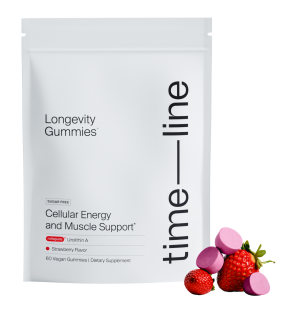With a profusion of consumer nitric oxide products out there, it’s nice to know that we’ve garnered the sponsorship of a truly science-based NO booster. Berkeley Life cares about the research, and has formulated a real physician-quality supplement that reliably boosts NO to support circulation. It’s the real deal for discerning consumers!
—Dr. Hoffman
This post contains sponsored content.
Nitric oxide is a vital signaling molecule essential in cardiovascular health. Unfortunately, as we age our levels start to diminish naturally. There are a number of factors which contribute to this, some of which are within our control and some of which are not.
Before breaking these down, it is important to be clear on the two distinct pathways for producing nitric oxide.

The L-Arginine Pathway (left) relies on the nitric oxide synthase enzyme (NOS) to convert L-arginine to nitric oxide. L-citrulline also operates through this pathway.
The Nitrate Pathway (right) involves inorganic dietary nitrate, ideally in the form of leafy green vegetables, which are broken down to nitrite in the mouth and nitric oxide in the body. This pathway is non-enzymatic therefore does not rely on the NOS enzyme.
Factors Affecting Nitric Oxide Formation

Age: As already noted, the body produces less nitric oxide naturally as we age. The NOS enzyme required in the L-arginine pathway becomes ‘uncoupled’ and can no longer convert L-arginine into nitric oxide. By the age of 40, this pathway is operating at 50% of its full capacity and continues to decline over time.
Inactivity: Exercise increases our production of nitric oxide. Avoiding a sedentary lifestyle is important to sustain healthy nitric oxide levels.
Diet: The Standard American Diet (SAD) consisting of highly processed foods causes inflammation in the body which limits the availability of nitric oxide. This diet is also largely devoid of leafy greens which are important in creating nitric oxide through the Nitrate Pathway.
Medication: Any medication that decreases nitric oxide will cause blood pressure to increase. NSAIDs Celebrex, and Ibuprofen are examples of medications that are linked to a higher likelihood of cardiovascular disease due to their effect on nitric oxide production.
Antibiotics and antibacterial mouthwash impact the oral microbiome which is important in breaking down nitrate to nitrite in the mouth. Chlorhexidine is an example of a prescription mouthwash which has been shown to decrease the nitrite concentration in the oral cavity by 90% while increasing blood pressure.
Anti-depressants such as SSRIs have been shown to decrease nitric oxide and are one of the reasons why using these medications is often tied to sexual dysfunction.
Genetics: all the genetics SNPs that increase oxidative stress will decrease the availability of nitric oxide. These primarily affect the L-Arginine.
MTHFR Gene: is essential in the formation of BH4 which is a vital component in the effectiveness of the NOS enzyme. Anybody that has the MTHFR SNPs by definition is nitric oxide deficient.
Stomach Acid: Proton Pump Inhibitors (PPIs) such as Nexium will decrease the production of nitric oxide through both the L-Arginine and Nitrate pathways. This is why regular usage has been shown to contribute to cardiovascular disease, kidney disease, and increased risk of dementia.
How to counter act these issues?
All of the above factors can be avoided through minor lifestyle modification and a focus on the consuming sufficient dietary nitrate. This can be achieved through a diet rich in leafy greens, similar to the DASH or Mediterranean Diet. Alternatively, you could look to a nitrate rich supplement to achieve the same benefits.
Berkeley Life Professional Nitric Oxide Support provides the dietary nitrate equivalent of five ounces of spinach or seven ounces of beets in each two-capsule dose. With age, regular usage will ensure optimal nitric oxide levels and a healthy cardiovascular system.
Beth Shirley has developed expertise as a pharmacist and certified clinical nutritionist during a 40+ year career. This experience spans compounding pharmacy for individualized treatment, drug nutrient depletion programs, bio identical hormone balance, wellness department development and management, dietary supplement integration, new product formulations and integrative medical practice development. Beth provides clinical nutrition services for wellness-focused individuals across the entire age spectrum. Her specialties include stress-induced hormonal imbalance, intestinal dysfunction, autoimmune and chronic inflammatory issues, detoxification, and super-normal oxidative stress. Over the last nine years Beth has spent time working with some of the leading thought leaders in the world of nitric oxide research and through this has developed an in-depth knowledge on the topic and its potential applications in patient care. She currently is the Executive Director of the Berkeley Life Scientific Advisory Board.







